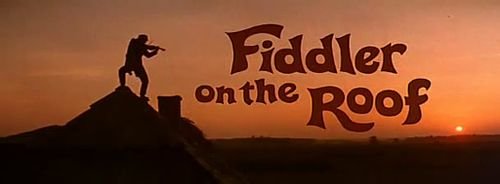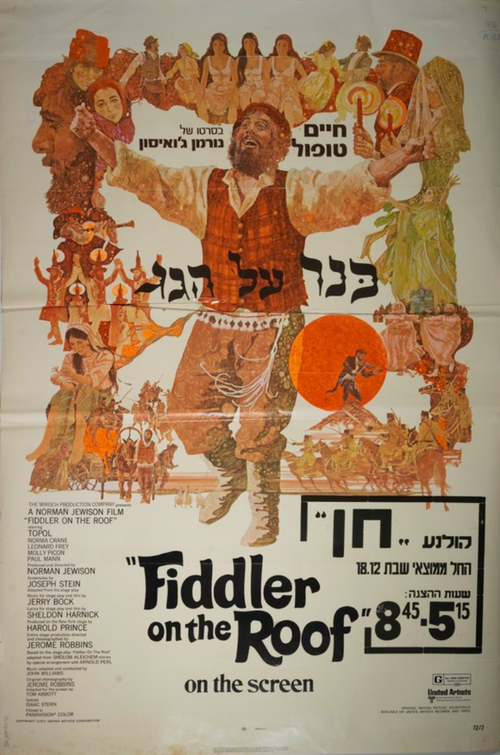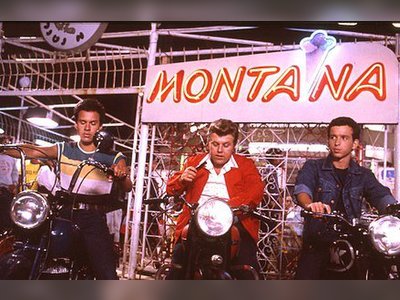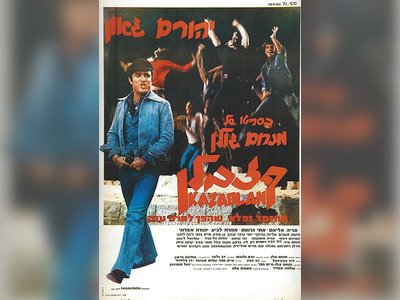מורשת גדולי האומה
בזכותם קיים
beta
Fiddler on the Roof (Film)
"Fiddler on the Roof" is an American musical film produced and directed by Norman Jewison. The film is an adaptation of the Broadway musical of the same name, which premiered in 1964 and tells the life story of Tevye the Dairyman in the town of Anatevka. The Israeli actor Chaim Topol stars as Tevye, reprising his role from the London stage production.
The film received enthusiastic acclaim in cinemas and was screened in many countries worldwide. It garnered positive reviews and won three Academy Awards and two Golden Globe Awards in 1971.
Plot:
Set in 1905, the film centers around Tevye the Dairyman, a poor Jewish man living in the Russian Empire in the typical Jewish shtetl of Anatevka. Tevye earns a living by raising dairy cows (hence his nickname) and selling their milk, butter, and cheese to the townspeople. He and his wife, Golde, have five daughters. His three eldest daughters each present him with a challenging dilemma: whether to arrange their marriages as per the town's matchmaker, as is customary, or allow them to marry the men they love, despite the difficulties involved.
Tzeitel, the eldest daughter, wishes to marry her beloved Motel, a poor and young tailor. In contrast, Yente, the town's matchmaker, convinces Golde to arrange a marriage between their daughter and Lazar Wolf, an older and wealthy widower. Tevye is torn between the two options but ultimately gives in to Tzeitel's tears and allows her to marry Motel the tailor. His second daughter, Hodel, puts him in a similar situation when she falls in love with Perchik, a young student who believes in revolution and socialism. Perchik is arrested by the authorities and sent to Siberia, but Hodel pleads with her father to allow her to follow him. Despite his initial resistance, Tevye gives in to Hodel's tears and permits her to go after him.
The most challenging test comes when Tevye's third daughter, Chava, whom he loves dearly, requests to marry a young man she loves. The problem is that her beloved is a Russian Christian named Fyedka. In this case, Tevye refuses to compromise his beliefs and principles and forbids his daughter from marrying her Christian love. Chava elopes with Fyedka and converts to Christianity in secret. Tevye, heartbroken, disowns her and performs a traditional act of tearing his clothes in mourning, as is done for the deceased.
The film portrays the lives of Tevye's family in Anatevka, a shtetl in Russia, during a time when many Jews were forced to leave their homes and villages due to pogroms and expulsions. Most of them emigrated to America and other European countries. The story highlights prevalent issues of the time, including religious observance, assimilation, modernization, and the early signs of socialism.
Production:
The film's production took place in Yugoslavia, specifically in the village of Lecevica (now in Croatia), which underwent renovations to resemble the fictional town of Anatevka where the events of the film unfold. The residents of Lecevica played the Jewish inhabitants of Anatevka. Prior to filming, director Norman Jewison visited Israel and met with Hasidic Jews to learn about their customs and traditions. The violin pieces in the film were performed by the renowned Jewish violinist Isaac Stern.
Release:
"Fiddler on the Roof" received widespread acclaim in cinemas and was screened in numerous countries around the world. In 1974, its screening was temporarily halted in Chile to ensure it did not contain communist messages.
Awards:
The film won three Academy Awards and was also nominated in several other categories, including Best Picture, Best Director for Norman Jewison, Best Actor for Chaim Topol, and Best Supporting Actor for Leonard Frey. Additionally, it received two Golden Globe Awards.
Revival:
In May 2020, it was announced that MGM, along with producers Dan Jinks and Aaron Harnick, would produce a modern adaptation of the musical, with Thomas Kail (known for his work on "Hamilton" and "Fosse/Verdon") directing and producing alongside Steven Levenson as the screenwriter.
Plot:
Set in 1905, the film centers around Tevye the Dairyman, a poor Jewish man living in the Russian Empire in the typical Jewish shtetl of Anatevka. Tevye earns a living by raising dairy cows (hence his nickname) and selling their milk, butter, and cheese to the townspeople. He and his wife, Golde, have five daughters. His three eldest daughters each present him with a challenging dilemma: whether to arrange their marriages as per the town's matchmaker, as is customary, or allow them to marry the men they love, despite the difficulties involved.
Tzeitel, the eldest daughter, wishes to marry her beloved Motel, a poor and young tailor. In contrast, Yente, the town's matchmaker, convinces Golde to arrange a marriage between their daughter and Lazar Wolf, an older and wealthy widower. Tevye is torn between the two options but ultimately gives in to Tzeitel's tears and allows her to marry Motel the tailor. His second daughter, Hodel, puts him in a similar situation when she falls in love with Perchik, a young student who believes in revolution and socialism. Perchik is arrested by the authorities and sent to Siberia, but Hodel pleads with her father to allow her to follow him. Despite his initial resistance, Tevye gives in to Hodel's tears and permits her to go after him.
The most challenging test comes when Tevye's third daughter, Chava, whom he loves dearly, requests to marry a young man she loves. The problem is that her beloved is a Russian Christian named Fyedka. In this case, Tevye refuses to compromise his beliefs and principles and forbids his daughter from marrying her Christian love. Chava elopes with Fyedka and converts to Christianity in secret. Tevye, heartbroken, disowns her and performs a traditional act of tearing his clothes in mourning, as is done for the deceased.
The film portrays the lives of Tevye's family in Anatevka, a shtetl in Russia, during a time when many Jews were forced to leave their homes and villages due to pogroms and expulsions. Most of them emigrated to America and other European countries. The story highlights prevalent issues of the time, including religious observance, assimilation, modernization, and the early signs of socialism.
Production:
The film's production took place in Yugoslavia, specifically in the village of Lecevica (now in Croatia), which underwent renovations to resemble the fictional town of Anatevka where the events of the film unfold. The residents of Lecevica played the Jewish inhabitants of Anatevka. Prior to filming, director Norman Jewison visited Israel and met with Hasidic Jews to learn about their customs and traditions. The violin pieces in the film were performed by the renowned Jewish violinist Isaac Stern.
Release:
"Fiddler on the Roof" received widespread acclaim in cinemas and was screened in numerous countries around the world. In 1974, its screening was temporarily halted in Chile to ensure it did not contain communist messages.
Awards:
The film won three Academy Awards and was also nominated in several other categories, including Best Picture, Best Director for Norman Jewison, Best Actor for Chaim Topol, and Best Supporting Actor for Leonard Frey. Additionally, it received two Golden Globe Awards.
Revival:
In May 2020, it was announced that MGM, along with producers Dan Jinks and Aaron Harnick, would produce a modern adaptation of the musical, with Thomas Kail (known for his work on "Hamilton" and "Fosse/Verdon") directing and producing alongside Steven Levenson as the screenwriter.
- כנר על הגג (סרט)he.wikipedia.org






